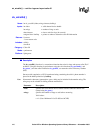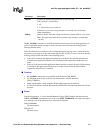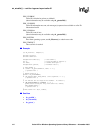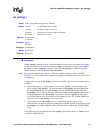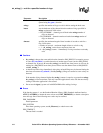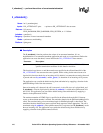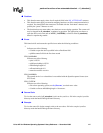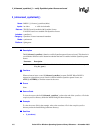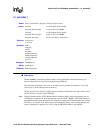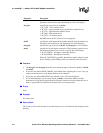
Voice API for Windows Operating Systems Library Reference — November 2003 447
perform the actions of an automated attendant — li_attendant( )
!
!!
! Cautions
• This function must supply values for all required fields in the DX_ATTENDANT structure.
• This function must supply an extension mapping function even if no extension translation is
required. You should prefix the extension to be dialed with the “flash hook” character and
possibly the “pause” character as well.
• The function does not return when a non fatal error occurs during operation. The current call
may be dropped but li_attendant( ) continues its operation. The application can choose to
open the device on its own and use ATDV_LASTERR( ) to find out if the li_attendant( )
thread is experiencing trouble.
!
!!
! Errors
This function fails and returns the specified error under the following conditions:
-1
Indicates one of the followng:
• Unable to open the device specified in the szDevName field
• pfnDisconnectCall fails the first time around
EDX_BADPARM
Indicates one of the followng:
• pAtt is NULL
• pfnExtensionMap is NULL
• nDialStringLength is 0
• nExtensionLength is 0
• named event does not exist
EDX_BADPROD
The opened device is on a board that is not enabled with the Syntellect patent license (non-
STC board).
EDX_SYSTEM
Indicates one of the following:
• Error from operating system; use dx_fileerrno( ) to obtain error value.
• Unable to allocate nDialStringLength +1 characters.
!
!!
! Source Code
To view the source code for li_attendant( ), refer to the syntellect.c file in the samples\syntellect
directory under the Intel® Dialogic® home directory.
!
!!
! Example
To view the source file for the example, refer to the attendant.c file in the samples\syntellect
directory under the Intel® Dialogic® home directory.




